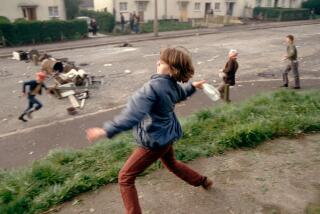BLIND TO THE BIAS IN ‘BELFAST’
- Share via
Brian Finney is correct (The Book Review, Jan. 3) that John Conroy’s “Belfast Diary: War as a Way of Life” and Sally Belfrage’s “Living With War: A Belfast Year” are valuable as source material on Northern Ireland, but his inexperience with the subject caused him to read Belfrage less critically than he should have. Knowledgeable readers can separate the wheat from the chaff but the less informed will come away with more inaccurate pieces of information than correct understanding of the issues.
Part of this is due to the fact that the bulk of those interviewed by Belfrage were not only anti-Irish nationalist but not familiar with even the most basic aspects of nationalist thinking. (One measure of the book’s tilt: She interviews several loyalist paramilitary leaders but no one from the IRA.)
The book is riddled with inaccuracies and one Finney cites naively as something he learned: that only 21% of Northern Catholics want a reunited Ireland. In fact, the Catholics are overwhelmingly Irish nationalists--Belfrage’s source (contradicted elsewhere in the book) is the leading loyalist newspaper, and anyone familiar with other polls and Catholic voting would have immediately known this was a distortion.
Also flawed is Belfrage’s analysis in the last chapter. An example is the discussion of the Catholic Church (since I do not belong I am not being biased). Protestant leader the Rev. Ian Paisley opposes divorce while most Catholics actually favor reform of Irish laws--the last referendum on this was defeated because it did not protect women. The policy of requiring children of mixed marriages to be raised Catholic has nothing to do with reunification--it is a theological/social problem that exists regardless of who governs the island.
The fact is, loyalist leaders admit these things are red herrings and they oppose unification regardless of reforms that may come. The real reasons for this militant opposition are a 17th-Century anti-Catholic, anti-Irish “racism” (loyalists identify with the Afrikaners) and groundless fears that Protestants would be dealt with as they have dealt with Catholics for centuries, should the country be reunified.
The only way for the economy to flourish on both sides of the border--another concern--is for there to be peace, and that will not come until Britain withdraws its troops and Protestants are forced to accept their Irish identity and face the 20th Century.
SCOTT S. SMITH
THOUSAND OAKS
More to Read
Sign up for our Book Club newsletter
Get the latest news, events and more from the Los Angeles Times Book Club, and help us get L.A. reading and talking.
You may occasionally receive promotional content from the Los Angeles Times.










